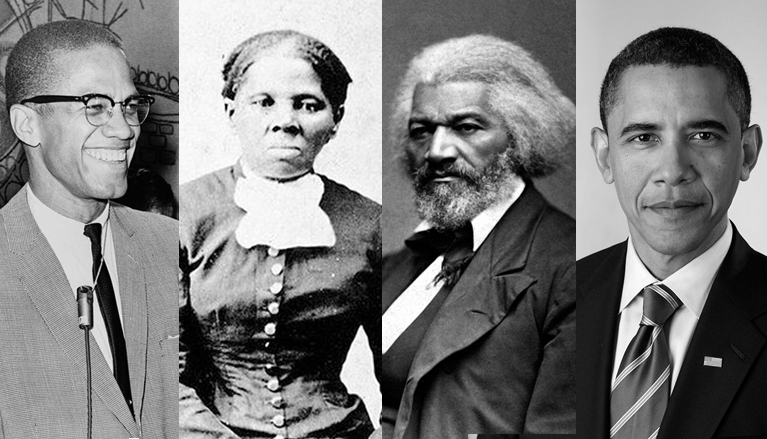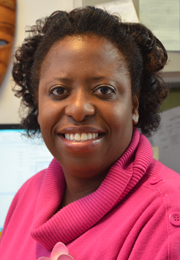SRU prepares to celebrate Black History Month

Jan 25, 2016
SLIPPERY ROCK, Pa. - Organizers of Slippery Rock University's Black History Month program in February hope it will help participants and the community "Remember and Reclaim," the people, issues and ideals of black history. The program will explore the echoes of past Civil Rights accomplishments while offering insight into issues still being felt across the country, such as police brutality against blacks, media profiling and economic inequality.

GIBSON
Corinne Gibson, SRU director of multicultural development, said she hopes programming will encourage students to become activists for change while also demonstrating to prospective students that SRU is passionate about diversity.
"For the average 16-year-old who may see or hear about what we're doing here at Slippery Rock University, what we're showing them is that students who come here will be supported in their efforts to bring change to a community," she said.
Black History Month is an annual observance for the remembrance of important people and events in the African Diaspora. Historian Carter Woodson and the Association for the Study of Negro Life and History created the precursor to Black History Month in 1926 when they announced the second week of February as "Negro History Week."
Gibson said the goal is to understand that what happened in the past matters, especially regarding the contribution of everyday black Americans, while remembering that black history awareness shouldn't be relegated to only one month.
Gibson said programs would broaden the perspective on African-American history, focusing on the contributions of ordinary citizens while paying tribute to famous groundbreakers such as Rosa Parks, who in 1955 refused to give up her seat to a white passenger on a public bus, and author Booker T. Washington.
"The ones you hear about are the famous ones, but there are so many other contributions black Americans have made and continue to make to society," she said. "This gives us an opportunity to shed light on them so that we can also talk about the present state regarding African Americans living in the United States. That is how it connects to our students today."
While many Civil Rights advances have been made, Gibson said it is important to never lose momentum for continued growth.
"We have made progress. However. We want to make sure we continue to move forward," she said.
Blacks have always been a major part of the American story, even if earlier generations of Americans didn't acknowledge their contributions.
"American history is black history," said Fidel Campet, an SRU instructor of history who teaches African-American history.
Campet said the history of Black History Month should be placed within the context of black struggles for equality in the 20th century.
When "Negro History Week" launched, racial segregation was the law of land in the south, through "Jim Crow" laws. Campet said whites with a particular slant, if it existed at all, taught the study of black history in the U.S.
"The very idea of studying African-American history was a huge battleground," he said. "The predominate idea at the turn of the century was that African Americans were people who have no history."
Leaders of the Black United Students at Kent State University first proposed the expansion from a weeklong focus to the month-long Black History Month focus in 1969. In 1976, the U.S. government officially expanded Negro History Week to Black History Month.
The push for a full-month focus mirrored demands at American colleges for greater curriculum inclusiveness, Campet said.
"Placing it in the context of the 1960s is very important with the Civil Rights and Black Power movement then," Campet said. "It was primarily student-led demands that we need black history in our curriculum; we need black studies programs that emphasize the African American experience, and you had faculty pushing and demanding that administrators create programs."
Campet said SRU's Black History Month will "open up windows" to help us understand the importance of transforming society.
"It is education that can be used to overcome ignorance and misunderstanding about how society functions," he said. "It is a forum of the empowerment platform to address inequality and discrimination that is embedded in society, ranging from wage inequality to police brutality and mass incarceration of blacks."
The month-long celebration will offer more than 10 events through Feb. 28. These include speakers, a business day, a workshop on black women body image and a presentation titled "Dangers on Black Males in America."
Black History Month activities at SRU will kick off with an opening ceremony at 12:30 p.m., Feb. 2, in the Smith Student Center Theater.
Kevin Powell, one of the most acclaimed political, cultural, literary and hip-hop voices in America today, will provide keynote addresses at 12:30 and 7 p.m., Feb. 16, in the Smith Student Center Ballroom. The author of 12 books, his newest title, "The Education of Kevin Powell: A Boy's Journey into Manhood," is a brutally honest memoir about his life.
One of SRU's events will continue throughout the month. An art exhibit, "Two Masters: David C. Driskell and Curlee Holton: A Collaboration of Creativity," will be displayed from Feb. 2-25 in SRU's Martha Gualt Art Gallery. Driskell is professor emeritus of African-American art at the University of Maryland. Holton is executive director of the David C. Driskell Center for the Study of the Visual Arts and Culture of African Americans and the African Diaspora at the University of Maryland. Holton is expected to attend the kick off ceremony.
Other events scheduled during the month include:
• "Black Mona Lisa: Black Women Body Image" at 6 p.m., Feb. 9 in 320 Smith Student Center;
• "Making Connections: Multicultural Alumni Networking" at noon, Feb. 13, at the Alumni House;
• "Black Love in the Media" at 6 p.m., Feb. 15, in 320 Smith Student Center;
• "Dangers on Black Males in America" at 6 p.m., Feb.16, in 320 Smith Student Center;
• A movie discussion on "Crash" at 4 p.m. in the Smith Student Center;
• "Soul Food Sunday" at 6 p.m., Feb. 21, in 321 Smith Student Center;
• "Poetry Slam" at 6 p.m., Feb. 22, in the Smith Student Center Ballroom;
• "Volunteer Day with Black Action Society" at 6 p.m., Feb. 23;
• "Business Day" at 6 p.m., Feb. 24, in 105 Vincent Science Center;
• The "Ebony Ball" at 6 p.m., Feb. 25, in the Smith Student Center; and
• A "Cultural Immersion Trip" to Washington, D.C., Feb. 26-28.
The Black Action Society, University Program Board and various University offices and personnel are sponsoring many of the events. Some events will be offered in tandem with SRU's February Race and Ethnic Diversity Month programming.
MEDIA CONTACT: Gordon Ovenshine | 724.738.4854 | gordon.ovenshine@sru.edu

